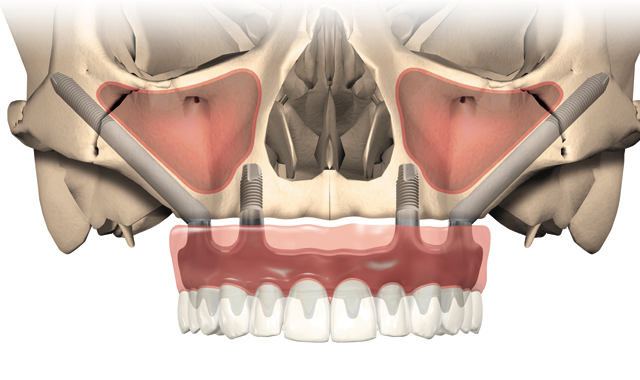New NobelZygoma implants an excellent option for treating severe maxillary resorption without bone grafts
For patients with severe maxillary resorption, extensive grafting procedures can mean lengthy treatment times. But there is an alternative. By anchoring in the zygomatic bone, the NobelZygoma implant system can enable an immediate loading protocol for a graftless treatment. It also offers a broad choice of prosthetic options. This dramatically shortens time-to-teeth for increased patient satisfaction, and allows patients with severely resorbed maxillae to return to a normal quality of life.

For patients with severe maxillary resorption, extensive grafting procedures can mean lengthy treatment times. But there is an alternative. By anchoring in the zygomatic bone, the NobelZygoma implant system can enable an immediate loading protocol for a graftless treatment.
It also offers a broad choice of prosthetic options. This dramatically shortens time-to-teeth for increased patient satisfaction, and allows patients with severely resorbed maxillae to return to a normal quality of life.1
High primary stability for Immediate Function
Nobel Biocare’s zygomatic implants are designed to achieve high primary stability.2 This allows patients with severe bone loss to have a fixed provisional prosthesis fitted immediately after surgery, avoiding the average nine-month wait and multiple surgeries required with grafting. Immediate Function with zygomatic implants has other benefits besides shorter treatment time, such as fewer clinical visits and a less invasive intervention compared to grafting procedures.
Related reading: Nobel Biocare unveils new implant, material, software solutions
Nobel Biocare Zygoma implants are the most documented zygomatic implant solution on the market for the severely resorbed maxilla. Not only does the procedure avoid complex bone-grafting, Zygoma implants show remarkable survival rates in a long-term study, with an average implant CSR of 95.12% after 10 years.3
Surgical flexibility
Building on 25 years of success with Nobel Biocare’s zygomatic implants, the new NobelZygoma implants anchor in zygomatic bone and provide an excellent option for treating severe maxillary resorption without bone grafts. They have an unthreaded implant body designed to interface with soft tissue, and depending on the anatomical situation parts of the implant body can be located outside of the maxillary sinus. For the extra maxillary placement the coronal part of the implant should still have bone support. This technique enables a position of the implant head close to the crest of the alveolar ridge that facilitates a prosthetic procedure which in turn offers easier cleaning and better comfort for the patient5 while improving phonetics.6
The implant of choice for severely resorbed maxilla
The zygomatic implant has become the implant of choice for cases with a severely resorbed maxilla. Without this implant, many patients would otherwise require invasive grafting procedures to establish adequate bone volume for the placement of conventional implants.
For more in implants, read: Implanting success: The state of dental implants
Zygomatic implants help avoid grafting and shorten treatment time, with significant improvements in function and esthetics.4 The zygomatic concept addresses the needs of this patient group by providing the implant surgeon more treatment options for the edentulous maxilla.
For more information visit nobelbiocare.com/nobelzygoma
References
1. Davo R, Pons O. 5-year outcome of cross-arch prostheses supported by four immediately loaded zygomatic implants: A prospective case series. Eur J Oral Implantol 2015;8(2):169-74.
2. Balshi TJ, Wolfinger GJ, Shuscavage NJ, Balshi SF. Zygomatic Bone-to-Implant Contact in 77 Patients With Partially or Completely Edentulous Maxillas. J Oral Maxillofac Surg 2012;70(9):2065-9.
3. Aparicio, C., Manresa, C., Francisco, K., Ouazzani, W., Claros, P. and Potau, J. M. (2014). The Long-Term Use of Zygomatic Implants: A 10-Year Clinical and Radiographic Report, Clin Implant Dent Relat Res, 16, 3, Oct 18, 447–459
4. Farzad P, Andersson L, Gunnarsson S, Johansson B. Rehabilitation of severely resorbed maxillae with zygomatic implants: an evaluation of implant stability, tissue conditions, and patients' opinion before and after treatment. Int J Oral Maxillofac Implants 2006;21(3):399-404.
5. Aparicio C, Ouazzani W, Aparicio A, Fortes V, Muela R, Pascual A, Codesal M, Barluenga N, Manresa C, Franch M. Extrasinus zygomatic implants: three year experience from a new surgical approach for patients with pronounced buccal concavities in the edentulous maxilla. Clin Implant Dent Relat Res. 2010 Mar;12(1):55-61.
6. Malo, P., et al. (2008). "A new approach to rehabilitate the severely atrophic maxilla using extramaxillary anchored implants in immediate function: a pilot study." J Prosthet Dent 100(5): 354-366.
ACTIVA BioACTIVE Bulk Flow Marks Pulpdent’s First Major Product Release in 4 Years
December 12th 2024Next-generation bulk-fill dental restorative raises the standard of care for bulk-fill procedures by providing natural remineralization support, while also overcoming current bulk-fill limitations.